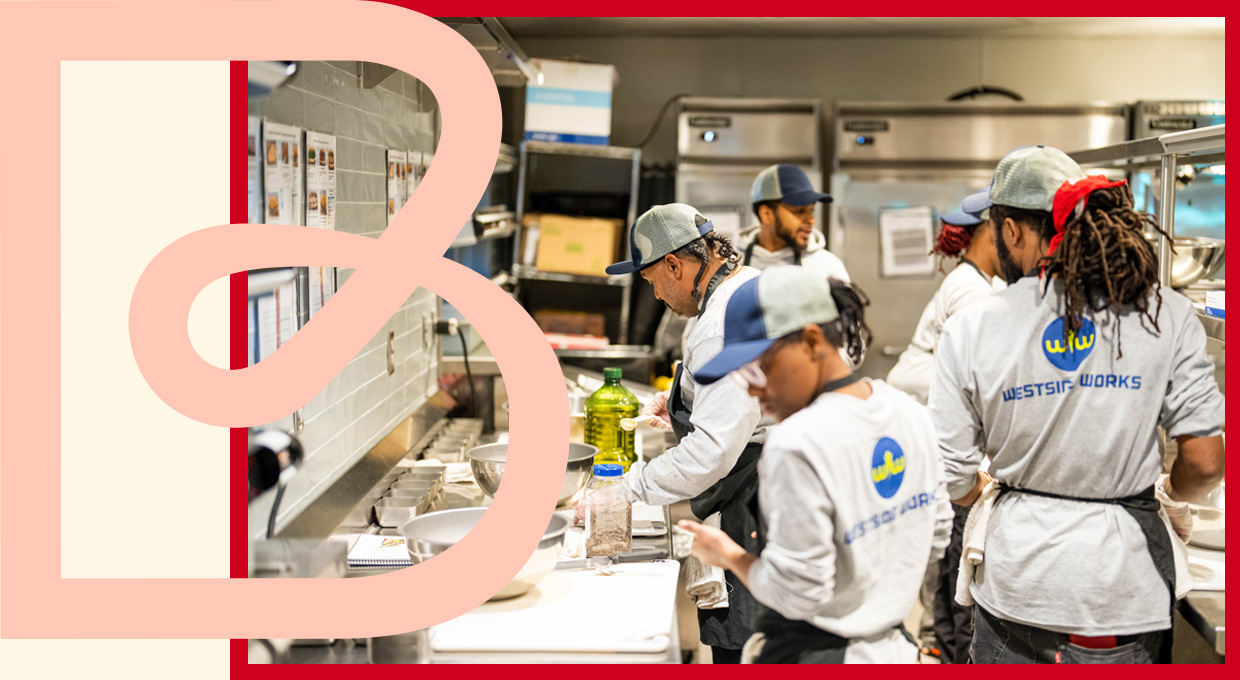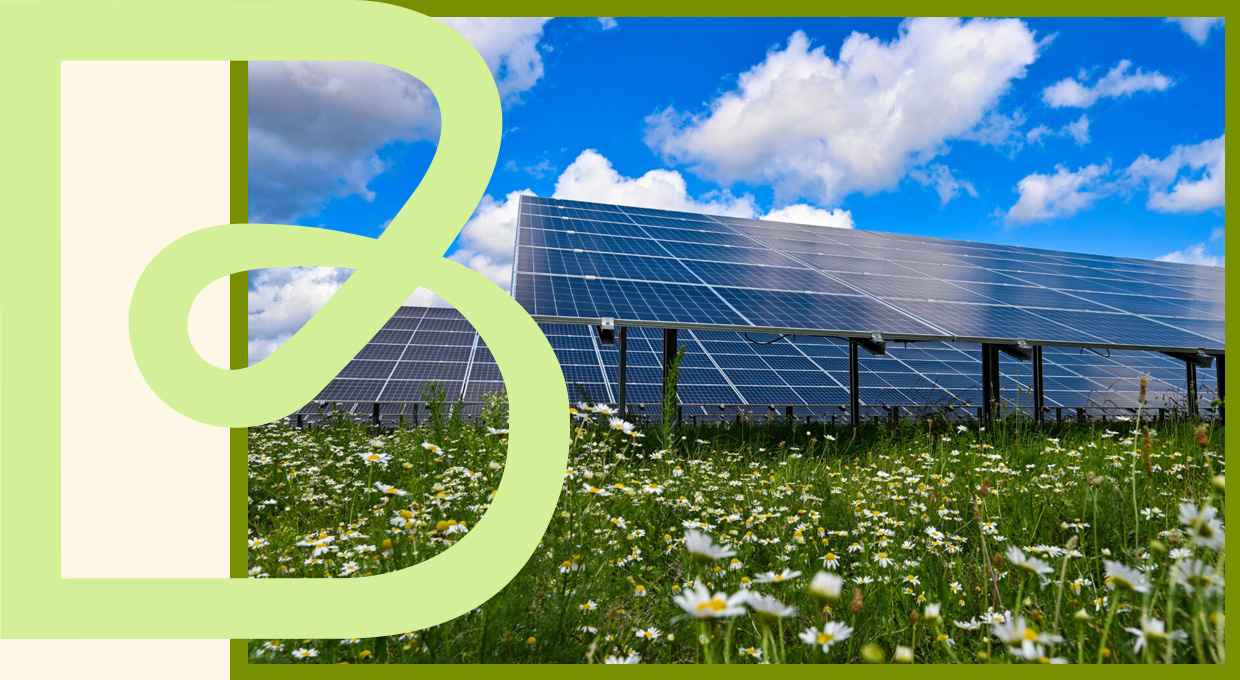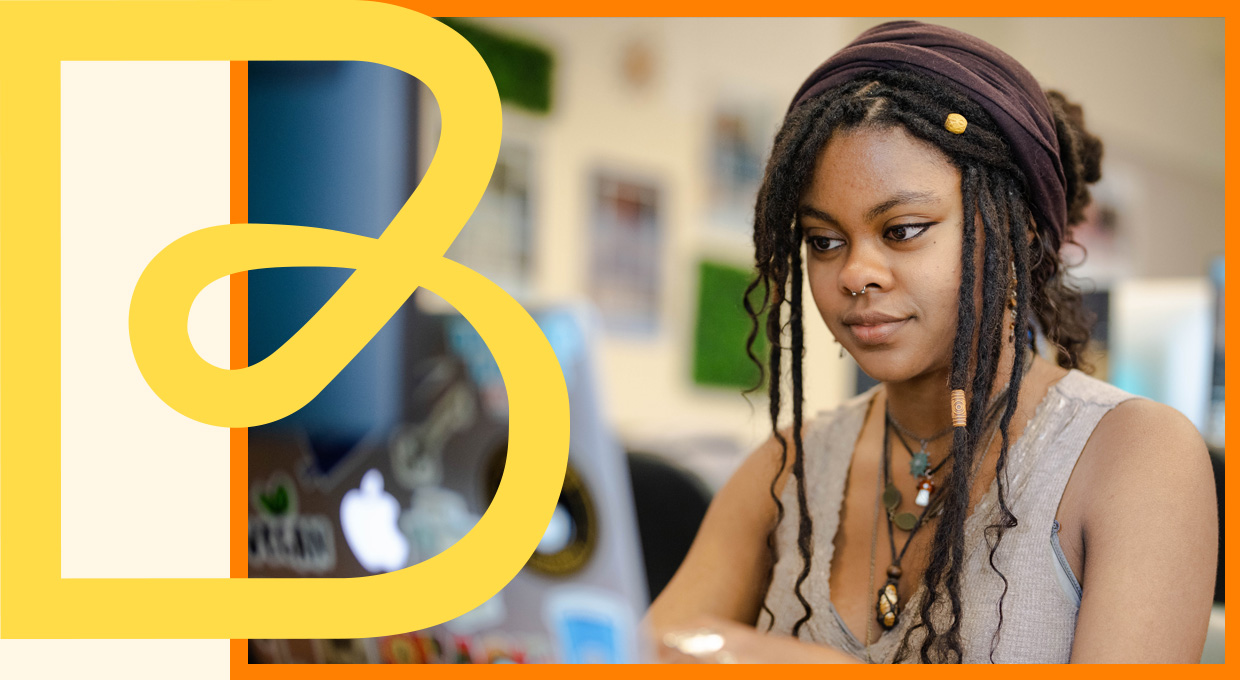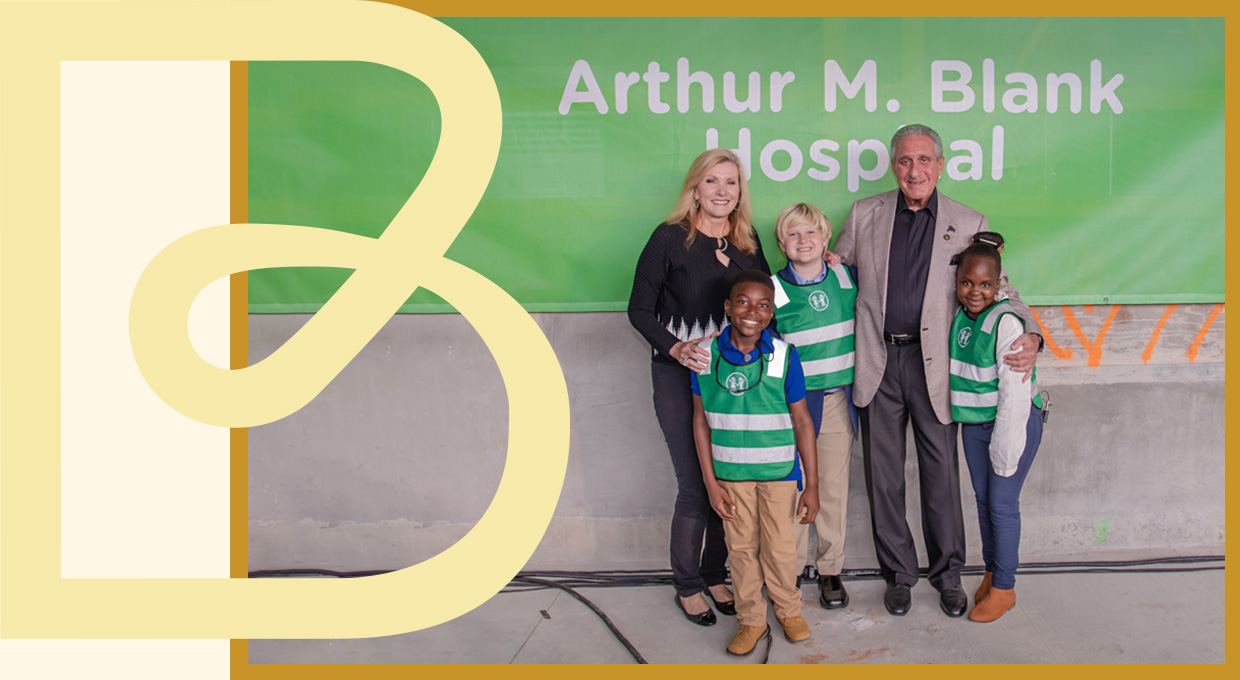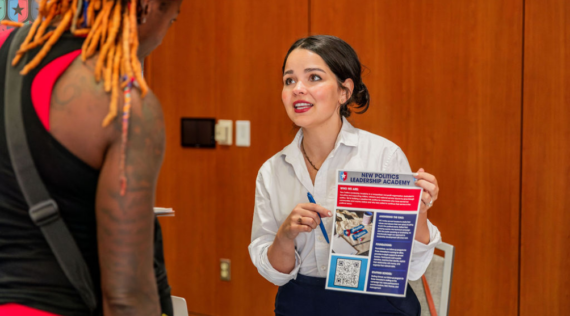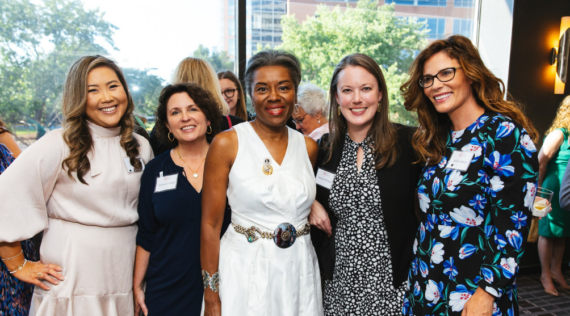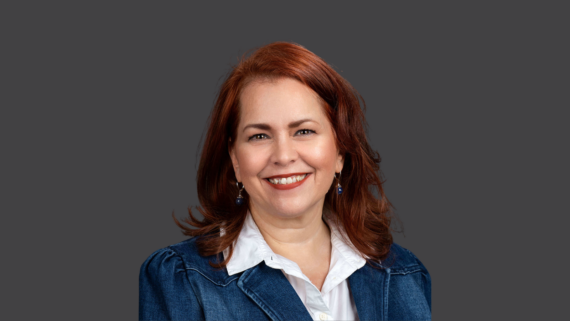Mormon Women for Ethical Government
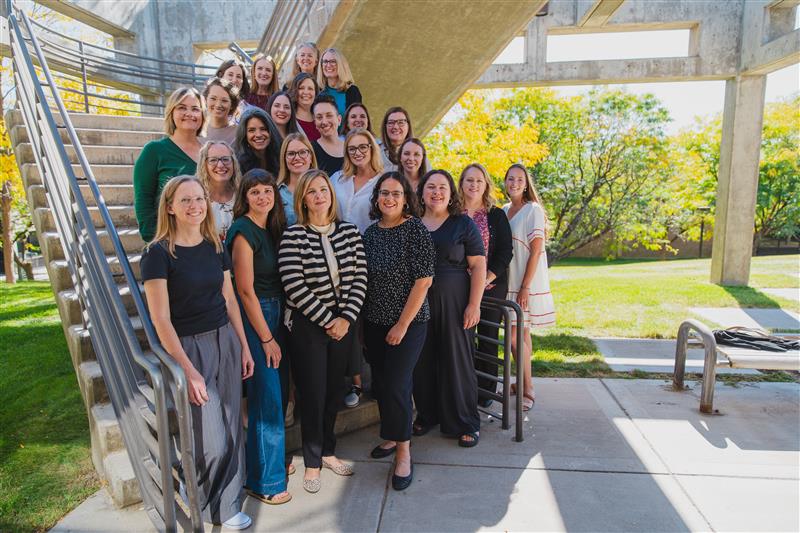
Mormon Women for Ethical Government (MWEG) is a faith-based, cross-partisan community of women dedicated to civic empowerment and engagement. MWEG resources prepare its members in all 50 states with information, training and opportunities to become more civically engaged and to participate meaningfully in politics.
Since its founding in 2017, the MWEG mission has been to inspire women of faith to be ambassadors of peace who transcend partisanship and advocate for ethical government. MWEG takes an active grassroots approach to many civic and political issues, including advancing democracy by protecting the ballot initiative process at the state level, preserving ethical guardrails at the federal level and building momentum for reforms to our electoral systems. In May 2025, the Arthur M. Blank Family Foundation awarded a $500,000 grant to MWEG to support the organization’s work.
A Conversation About Advocacy and Building Bridges
Emma Petty Adams, Co-Executive Director of MWEG, recently participated in a thought-provoking Q&A with the foundation, during which she shared more about the organization and its mission.
Q: How do you see the importance of MWEG’s mission in today’s political climate?
A: I think it becomes even more important every day as Americans and legislators become more polarized. People push themselves to the sides and choose a team, stick with that team and want that team to win, no matter what, and we all suffer due to one-sided policymaking and a lack of skilled collaboration and compromise. Disagreement is normal and natural, conflict can be productive and bring forth new ideas, but when political team sports turn into partisan warfare, we all suffer. At MWEG, we prepare our women to build bridges with their community and elected officials, but always to do so in a way that is supportive of democratic norms and with an eye to action beyond conversation. And we want the work to be nourishing. As our women participate in this process, we want them to grow as people and transform, to become better humans and be more empowered and effective.
Q: MWEG uses the phrase “transcending partisanship” often. What does that look like in practice, especially in a deeply polarized environment?
A: It really comes down to identity. Many of us have grown up with the false understanding that our political identity needs to become our full personality. Sometimes, even in faith spaces, those two things get mixed up. We help women identify the principles and values behind their political identity and then find common ground. We’re not asking women to walk away from the labels they use, such as Republican or Democrat, conservative or liberal. But what we’re asking them to do is assert a higher identity, the identity of being a principled citizen or a principled voter and have that be their primary guiding identity. This allows them to be more effective in their advocacy. It helps them build bridges because they can find areas of common value and principle with someone who votes differently.
Q: What strategies have been most effective in building bridges across these divides?
A: From a faith perspective, we are in broad agreement that peacemaking is a foundational principle if we want to successfully navigate divides. But what does that actually look like when things get messy, complicated and hard in the face of diverse opinions and experiences? We have multiple discussion spaces with frameworks, rules and moderators to help guide the process. When you provide an opportunity for people to engage with one another, you have to lay down some rules to encourage productive conversation. And you have to be prepared to fail but stay committed to trying new things out to make it better– we are in constant dialogue about this as a leadership team, perpetually chasing better ways to encourage conversation that stretches everyone involved and generates interesting ideas while creating space for divergent voices.
This is a bit of an audacious goal and requires more than just philosophy– we are committed to building concrete skills. One example would be helping women identify their default conflict resolution style. We all have a mix of “tricks” that we deploy in order to manage conflicts, from accommodation to competition and everything in between. If you identify your personal predisposition, learn about the other options, and then increase your “conflict resolution repertoire,” you will engage more effectively. When this is done, it’s easier to have complex conversations with everyone, from elected officials to your conspiracy-loving brother in the family group text thread. In our experience, when women do this, they feel freer to engage with people with a whole heart, breaking from ineffective patterns that were constraining them in the past.
Q: How does MWEG identify and support women who may not see themselves as civic leaders?
A: This is at the core of a lot of what we do. Too often, we come to political engagement or civic engagement believing that there’s a very narrow way to do it. Maybe everyone has a picture in their mind of what an advocate is. The vast majority of our women are already engaged civically. They just don’t necessarily see it as such. Our women are coming with years of experience organizing community members, whether it be at the church or with their families or the Parent Teacher Organization. It’s really just uncovering the reality of what they’re already doing, helping them name it as important, meaningful and good, and then providing opportunities for them to do more in the community and beyond, leveling up as inspiration strikes and circumstances permit.
Q: Another side of your work is a grassroots approach to defending, advocating for and advancing democracy. How do you balance defensive efforts with proactive reforms?
A: We’re trying to provide opportunities for our members at every point along the journey. Every decision we make about what we advocate for as an organization is really grounded in what our women are interested in and where we feel we could make a measurable difference to advance democracy. Maybe you came to MWEG because you wanted to learn how to have difficult conversations, or maybe you care about refugees or maybe you care about clean air for your children. Participants learn about the structures, processes, rules and policies that help a democracy function to its fullest ability and then they grow to be some of its strongest defenders. We’re trying to provide ways for agency-driven women to come to these places in an authentic way and to build trust with us as an institution so that when we invite them to participate at key moments, they are willing to do so.
Q: Can you explain the benefits of media literacy as it relates to MWEG’s work?
A: Media literacy includes all the skills needed to sort through the complex media environment, access good information and recognize truth. Trying to differentiate between opinion and fact and choosing media sources to trust can require guidance. Before we start to advocate or work on an issue, there’s a whole layer of work to be done to make sure that we’re providing good information and that we’re empowering women with the skills to do it themselves.
If something comes your way on social media and it boils your emotions immediately or sends you into a passionate fit, it might be something meaningful and worthy of your attention, or it could also be a manipulation of your emotions. Pausing to assess the situation makes all the difference. In this media environment, we need all of our people to think through that lens to be really good, effective advocates.
Q: How can partners best support your mission moving forward?
A: We’re grateful to have partners with whom we’ve built up trust over time. Within grassroots work, where you’ve got thousands of people involved, trust is crucial. Our best philanthropic partners are ones who understand and trust that we know our audience, we know how to mobilize them, and we know how to empower them effectively. Ultimately, the long-term change that the Arthur M. Blank Family Foundation and others want in terms of systemic structural reform will require long-term resilience from the people involved, which means having models that support and build people as independent agents. Our philanthropic partners understand how much time and investment in humans is required.
In a divisive world, MWEG is a community of women of faith building a more peaceful, just and ethical world. This grant to MWEG aligns with the foundation’s Democracy strategy aiming to increase effective, responsive governance by advancing electoral reforms, improving leadership pipelines and increasing cross-partisan connections among elected leaders.
Stay Connected
Stay up to date with stories of impact, grants in your neighborhood and other interesting foundation news.
By submitting this form, you are consenting to receive marketing emails from: Arthur M. Blank Family Foundation, 3223 Howell Mill Road, Atlanta, GA, 30327. You can revoke your consent to receive emails at any time by using the SafeUnsubscribe® link, found at the bottom of every email. Emails are serviced by Constant Contact

